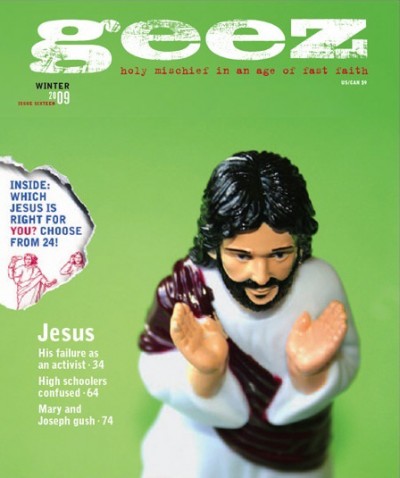Harmonizing without homogenizing
SOMEONE ONCE TOLD ME that unless those of us who are from “so-called privilege” submit to and are mentored by a person of colour we are just blowing off smoke when we denounce that privilege.
Editors note: This is a response to Nate Buchanan’s article which first appeared in Geez 15. See other responses by Leroy Barber and Eliacín Rosario Cruz here, and by Jonathan Wilson-Hartgrove here. - Aiden Enns, Editor, Geez magazine
SOMEONE ONCE TOLD ME that unless those of us who are from “so-called privilege” [see note 1] submit to and are mentored by a person of colour we are just blowing off smoke when we denounce that privilege. It wasn’t long after that I joined civil rights legend John Perkins. John, the son of a sharecropper, saw his brother killed by police officers during the civil rights movement. His teaching helped us form many of the “12 Marks.”
It is John who taught me the language of Relocation, Redistribution and Reconciliation. For him, Relocation is about three types of people who reorient their lives around the margins rather than the centres of power (and poor folks are just as susceptible to believing the world revolves around D.C. or Wall Street or Hollywood). It takes all three groups to rebuild a broken neighbourhood: Remainers (indigenous folks who could leave but don’t), Returners (indigenous folks who leave to acquire skills and education and then bring them back), and Non-indigenous relocators (folks who missionally move into a tough neighbourhood from outside). No doubt it should outrage us when the latter gets more airtime, for the first two are the real heroes.
When it comes to Redistribution, John has taught me it is important to speak of the “needy among us” because it locates our lives among those in need. It doesn’t mean we are not poor, but it does ensure that we do not speak of the poor as “out there” or “other.” We must be in, of, and among those with needs. No doubt, downward mobility is just half of what God is doing in the world. Those of us on that downward path must walk with and be led by those who are being liberated from oppression, just as we are being liberated from oppressing. We must recognize that just as God is liberating some of us from the ghettoes of poverty, God is also saving people from the cul de sacs. There is a two-lane highway into the kingdom – the mighty being cast from their thrones and the lowly lifted; the hungry filled and the rich sent away empty; the last becoming first and the first becoming last.
There is certainly more to be said about the subtle ways whiteness and “so-called privilege”? can affect our (“our” being all peoples’) vision and language and movements. And, while folks in new monastic circles have made some huge strides to not simply “lament racial divisions” but “pursue just reconciliation” there is still much more to be done.[see note 2] We invite any wisdom that might help us do things better. Meanwhile, I am also committed to combating the sometimes-paralyzing nihilism and self-deprecation that often comes from “white guilt.” Often there is a crippling negativity that comes from my white peers who feel incapacitated by their whiteness, whereas many of my neighbours and friends who are people of colour live lives that neither ignore these dynamics nor give them the power to stop them from doing any good.
Several years ago, John came to Philadelphia and I complained to him about the whiteness of the new monasticism movement. His response was: “Don’t be so hard on yourself. You need to teach what you know … and that truth is setting others free. But then you also need to be a good listener, learner and collaborator. Teach what you know and learn what you don’t know.” So that’s what we are still after.
It is for this very reason that John and I just wrote a book together (Follow Me To Freedom:http://www.regalbooks.com/webapp/wcs/stores/servlet/ProductDisplay?catalogId=10552&storeId=11052&productId=46162&langId=-1). I am committed to not being a soloist, but to harmonizing and putting my voice alongside others. And to seeing our various communities and movements not as the Body of Christ in and of themselves, but as cells of the larger body. Ultimately, we simply want to see folks move closer to our Lover Jesus.
There is no pretence that new monasticism is the hub of everything good or fresh that God is doing, which is exactly why we align ourselves with others like the Christian Community Development Association (ccda.org:http://www.ccda.org/).[see note 3] We are simply trying to get the log out of our own eyes. The older I get the more I am aware of that log and all its intricacies, and I always welcome anyone who will help me see it more clearly, or better still, help me get that sucka out.
Notes:
#. Friends from backgrounds different than mine point out that when we refer to the fact that our ancestors did things like slaughter indigenous people, steal land and kidnap entire populations, we should leave no ambiguity about our disapproval, and we should create a degree of objectivity by referring to this not as “privilege” but as “so-called privilege.”
#. When we bring groups into our communities as Nate mentions, we ensure that this does not create the dynamics of patronization. The groups we work with are carefully trained to understand these dynamics. Or, we choose not to host groups at all, as is the case at The Simple Way.
#. For several years, a major TV network has asked to do a feature on The Simple Way, and I insist that we will only do the story if it is on the recovery community at New Jerusalem or on CCDA. They have not done the piece.
Shane Claiborne is a member of The Simple Way community in Philadelphia, Pennsylvania.



Sorry, comments are closed.